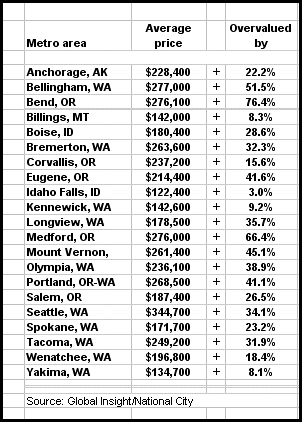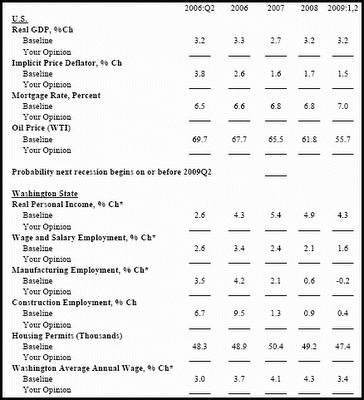The past couple of days are only the most recent of a general decline in the markets. Our Executive Director sent me a link to a
Daily Kos diary by bonddad recounting Fed action and a mainstream take on the Market downturn. It will be no surprise to habitual readers that I have little patience for either.
The Fed:It is reasonably clear that the U.S. economy is entering a period of transition. For the past three years or so, economic growth in the United States has been robust, reflecting both the ongoing re-employment of underutilized resources as well as the expansion of the economy's underlying productive potential, as determined by factors such as productivity trends and the growth of the labor force. Although we cannot ascertain the precise rates of resource utilization that the economy can sustain, we can have little doubt that, after three years of above-trend growth, slack has been substantially reduced. As a consequence, a sustainable, non-inflationary expansion is likely to involve some moderation in the growth of economic activity to a rate more consistent with the expansion of the nation's underlying productive capacity.
(Remarks by Chairman Ben S. Bernanke at the International Monetary Conference, Washington, D.C., June 5, 2006.)
This quasi-academic jargon seems to be borrowed from the outgoing master of obfuscation, Alan Greenspan. Underneath is pap. I'm sorry. In this corner we have not recognized the supposed recovery of the past three years. To say the economy recovered or "economic growth was robust," you need to explain away the enormous private and public debt. If you don't, you are saying a credit card is a paycheck.
If you excuse the debt by saying it went to building productive capacity, then how come we've run out of productive capacity? In fact, the
private debt has gone to housing (a nonproductive asset) and to consumer debt (much of it folded into mortgages by home equity loan). The
public debt has gone to a stupid adventure in Iraq, to a raid on our Social Security Funds, and to tax cuts for the rich. We showed
charts last week. I have another one here somewhere I'll put up Thursday.
We explained just yesterday why raising interest rates into cost-push inflation (aka
stagflation) is not useful, how it precipitated the last bust when Greenspan did the same thing, and how it exposes a deep misunderstanding of the economy. [What, you say, could be a deeper misunderstanding than calling a credit card spending binge a recovery?]
The crippling fact is that the single source of strength in this economy is productivity growth, and that has been compromised away. On the front end, productivity has not translated into wage and income growth for the working class, and hence not into broad-based demand. (See
EPI's work on this point.) On the back end, I suspect, much of the so-called growth in productivity actually comes from downsizing, outsourcing and other cost-cutting that is not really growth in productivity, but shedding labor.
The MarketOne of my friends is a market watcher and outstanding saxophone player. He has recounted how he watched in frozen fascination several years ago as the dot.com bubble burst, allowing his portfolio to dwindle before his eyes without acting. Not this time. He saw this market tanking over three weeks ago, Thursday and Friday, May 10-11. Down. Broadly down. He trimmed his exposure. And I give him credit here for probably picking the turning point, because I do not watch the market.
You get the picture from bonddad's comments at Daily Kos that inflation-fighting via the interest rate is widely perceived as a cause of market weakness. It may be. But it is not a primary cause of
economic weakness. The Fed's short-term rates have become disconnected from the long-term rate-setting. The real question is, What is the reason for any Market strength? As Chris says,
What good news is there out there?"None. Massive budget deficits, massive trade deficits, huge debt overhang (soon to be worse for higher interest rates), abysmal war, declining dollar, terrible exposure to energy prices, corporate corruption, shrinking manufacturing capacity, and of course, a incompetent regime in power. What good news IS out there to make someone buy a stock?
Stock prices are at their current levels not because of strength in the economy, but because the guys overseas have to do something with the dollars we keep sending them, because baby boomers are hoping to squeeze another little bit out before they retire, and maybe because rich people need a place to park their tax cuts.
Market behavior is herd behavior. [One of the most absurd contentions ever was the "efficient market hypothesis," the idea that the market factors in all information efficiently. No. It is herd behavior.] And this herd ought to be spooky. They really have no good place for their money, with housing glutted and bonds paying low rates. But they can't afford to lose too much.
PredictionLook for a wholesale if somewhat gradual shift out of the country, particularly in face of the declining dollar. And look for a market crisis, sooner or later. Derivatives have likely supported the market by masking risky behavior. Derivatives are not well regulated. A shift south in the Market could expose some rickety underpinnings to the whole contraption.
On the other hand, I'm an inveterate doom-sayer.
[But aren't those termites under that roller-coaster?]






